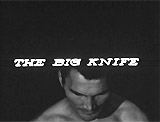
|
The Big Knife (1955)
In director Robert Aldrich's and United Artists' cynical
and depressing screen adaptation (by James Poe) of Clifford Odets'
1949 Broadway stage play (directed by Lee Strasberg, and starring
John Garfield) - this dark and film noirish, over-the-top look at
Hollywood's corrosive and ruthless search for fame and power was
revealed through rich, verbose and abstract dialogue. The themes
of the dense plot included infidelity, corruption, betrayal,
and criminal cover-up of murder. Aldrich's deep-focus cinematography,
canted angles, and extreme close-ups accentuated the claustrophobic
setting - mostly within the living room of a Bel-Air mansion populated
by a parade of characters who confronted a nerve-addled, tormented,
and unhinged Hollywood actor.
The devastating critique of Tinseltown
(similar to Billy Wilder's Sunset
Blvd. (1950) and Aldrich's later film What
Ever Happened to Baby Jane? (1962), and other 50's films
In a Lonely Place (1950) and The
Bad and the Beautiful (1952) and the more-recent Coen Brothers'
Barton Fink (1991)) and
its moral turpitude was refused by most of the major Hollywood studios,
but then was supported by UA. Many interpreted the characterization
of the studio boss in the film as approximating Columbia Pictures'
mogul Harry Cohn, with some resemblance to MGM's Louis B. Mayer.
Others interpreted the film as an allegorical attack on McCarthyism.
The crime-melodrama told the overheated story
of actor Charles 'Charlie' Castle (Jack Palance) - a philanderer
and drinker who was struggling and at a personal crossroads with his
life, due to his estrangement from his idealistic wife Marion (Ida
Lupino in her last great screen role), his own complete psychological
and moral collapse, his suffocating career as an actor in bad and
exploitative films, and the blackmailing control exercised over him
by a vulgar, explosive studio boss in the Hollywood machine that
forced him to continue making compromising, soul-crushing movies.
- the film's innovative title screens (designed by
Saul Bass) were displayed over a view of the tormented and anguished
actor looking downward with his head in his hands
- the opening voice-over narration was delivered by
an uncredited Richard Boone, as the camera surveilled the area
of luxury homes seen in a montage: "This
is Bel Air, the lush, luxurious retreat of the wealthy and powerful.
If you work in the motion picture industry and are successful,
this well-tended suburb of Hollywood is where you will probably
make your home. Failure is not permitted here"
- the camera traveled
to the backyard of narcissistic actor Charlie Castle's (Jack Palance)
Bel-Air mansion where he was observed sparring with his house-helper/partner
Nick (Nick Cravat): "Our story has to do with a 20th-century
phenomenon. Name: Charlie Castle. Profession: movie star. Problem:
survival. Charlie Castle is a man who sold out his dreams but he
can't forget them"; in other words, Charlie was facing
a downhill-slide in his career with feelings of regret and guilt
- the film's weak-willed protagonist, Hollywood movie
star Charlie Castle had "sold out his dreams" by
appearing in lesser B-movies, and by working under the machinations
of an oppressive, vicious and amoral studio system
- in the opening sequence, Charles was informed by his friend and studio
publicist Buddy Bliss (Paul Langton) (who was assigned to "keep
you out of trouble") that loathsome and acidic
gossip columnist Patty Benedict (Ilka Chase) had just arrived in
the house for an interview - she was obviously looking for a juicy
scandal and details about rumors that she had heard, that Charlie
and his wife were on the verge of filing for divorce
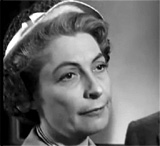
Patty Benedict (Ilka Chase) - Nosy Gossip Columnist
|
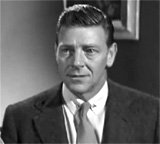
Buddy Bliss (Paul Langton) - Charlie's Friend
and Studio Publicist
|
- in the opening scene set inside Charlie's Hollywood
mansion (with a grotesque painting of The Pierrot (1920) by
Georges Rouault hanging in the living room), he told the writer his
beliefs included: "Health, hard work, rare roast beef, and good
scripts"; she knew he was about to re-sign a renewal of his
studio contract; and she demanded to have the initial 'scoop' of
the dirty details of his possible marital split; she also revealed
her knowledge of a previous studio scandal that involved Charlie's
friend Buddy, who was rehired after serving 10 months in jail; she
asked why Buddy had been kept on the payroll (although he served
10 months in prison for a DUI and hit-and-run accident caused by
Charlie), and hinted that she threatened to dig up more dirt on Charlie's
past life about the incident; Charlie suggested forgetting the past: "Didn't
he step up in time and take the blame?" and recommended that
she close the books on the story: "Why would you want to open
up that tired old can of peas?"
- when he refused to provide any more details about
his marriage, Charlie attempted to dismiss her; from
the upstairs via a circular staircase, Charlie's idealistic, estranged
wife Marion (Ida Lupino) entered the conversation; she had just arrived
after a shopping trip; she abruptly told the persistent tabloid
writer Patty Benedict, who had asked: "You are separated, aren't
you?" - that their marital affairs were none of her business: ("Our
personal life is not your affair!...I am not afraid to tell you to
mind your own business")
- afterwards, both Charlie and Buddy mildly and briefly
scolded and rebuked Marion for harshly mistreating Benedict as
the columnist left in a huff and sped off: (Charlie: "I'm
in the movie business, darling. I can't afford your acute attacks
of integrity"); he added: "She has 18 million readers,
why antagonize her?"
- they spoke briefly about their estrangement; she
was in and out of his life after having moved out of their Bel
Air home to a beach home with their young son Billy (Michael Winkelman);
she was completely aware of his philandering and infidelities
with floozies: ("occasional girls") and wished that he
would become more committed to her and their marriage ("A
man can live only one of two ways: either married or like a bachelor;
what you want is the best of both! And that's not a marriage, not
in my book"); she urged him to attempt to rescue their marriage
- but only if he disattached himself from his dependence on his
studio boss: (Charlie: "I don't belong to Stanley Hoff!...I'm
a free agent!"); she wondered
if he had signed the renewal on his iron-clad 7-year studio contract
with Hoff, and if he was going to continue to have a profligate
lifestyle of drinking and womanizing; he mentioned his desire to
restore their lives: ("I want you to come back home to
me....You know, I'm far from perfect,
but you're making a big mistake if you think you can face this big
wide world alone"); she mentioned that their
mutual writer-friend and studio scriptwriter Horatio 'Hank' Teagle
(Wesley Addy) had already boldly proposed marriage to her, and was
leaving for NYC in a few weeks to write a new novel; and then Marion
reminded him to send his routine check to pay her bills
- Marion's most definitive statement was her threat
to leave Charlie permanently if he signed Hoff's contract,
and continued his downward spiral in life: "You say you want
me to come back to you. Well, believe me I won't, not ever if you
sign that contract...Look at yourself, you're half-dead right now!...What's
happened to your mind, your spirit, your soul?...What do you believe
in now?"; she reiterated: "I don't want you to sign
that contract! You've given the studio their pound of flesh," but
he argued with her about not giving up his lucrative lifestyle and
acting contract, although it had sucked the life from him
- the couple briefly discussed how some directors,
instead of producing lucrative, commercially-successful low-brow
entertainment for the masses, had created inspiring works of art
on the big screen with "guts and meaning," such as "Stevens,
Mankiewicz, Kazan, Huston, Wilder, Wyler and Stanley Kramer, but
never Stanley Hoff, never, not once, not for the life of him";
they regarded Charlie's studio-boss as only being interested in
the bottom-line; she still felt that they had "a second chance"
to redo the wrongs of their past decisions; he confessed that he
had been stalling for weeks and months about signing, but now faced
a tough decision; Marion had confidence in Charlie's future:
"It's in your hands"
- during his outdoor rub-down on a massage table from
trainer Mickey Feeney (Nick Dennis), Charlie insisted to his kindly
and compassionate but spineless agent Nat Danziger (Everett Sloane)
that he would not be signing his contract, due to Marion's "dead-set"
wishes and his desire to keep his family; he kept stating that
he had not agreed to sign it, and that it would lock him into doing
more "lousy, lousy pictures" instead of more inspiring
and artistically fulfilling movies; Charlie was informed that the
studio boss would be dropping by shortly for a "showdown"
- Charlie begged - "You gotta get me out of this"
- and wanted Nat to rescue him; however, his agent stated that
Charlie's idealism ("You're a special idealistic type")
wouldn't work or "mix" well with business ("It's oil
and water"), and that he had no "bargaining
power" with the studio; Nat was concerned what the blackmailing
Stanley Hoff would do if Charlie tore up the contract and moved
away: ("What he would do! We've got no choice, Charlie. You
know what he's got on you - that thing we don't talk about. Darling,
you sign or you go to jail"); Charlie
knew that every possible avenue for him to choose was entrapping
and destructive: "Every way is a way to die, huh?"
- Charlie was about to be blackmailed by the studio-boss
of Hoff-Federated Studios; his domineering, bear-like, tyrannical,
white-crew-cutted studio boss Stanley Shriner Hoff (Rod Steiger)
and his slimy, bland, and obsequious lawyer-assistant Smiley Coy
(Wendell Corey); the two arrived to pressure their "property" to
reluctantly sign and renew his contract for a term of 7 more years
- after some small talk, Charlie bluntly asserted: "I
don't wanna sign the contract"; he said he was through with
Hollywood and making pictures and wanted to go away
"for good"; Charlie only agreed to "sign
anything guaranteeing you I'll never make pictures again"
- Charlie was reminded by Hoff of the murderous Faustian deal
that had saved Castle's career: "You
came to see me more than once....I was there for you and yours in the
vexing problems that are so manifold in the heat and toil of the day.
And then on a certain night in this very room, the law spelled scandal,
I was there for you then too!"
- in an emotional monologue, Hoff persuasively
argued that Charlie's dependent wife Marion should supportively
advance her husband's career rather than impede it: ("The woman
must stay out of the husband's work when he earns
her bread and butter!");
- Charlie honestly admitted
that both he and Stanley didn't like each other, and then asked
and begged again: "I'll promise you anything you want if you'll just
let me go"; but then Charlie surrendered and signed the contract; he decided to
keep the pen - one among many that was used to end WWII: ("I'll keep
the pen. It's my only proof that the war is over or that it was ever
fought"); Nat was relieved that they now both had 7 years of "financial security"
- afterwards, he mused to Nat: "He twisted my neck
like I was a 10-cent rag doll"; during a phone call from Marion
moments later, Charlie sheepishly admitted: "I lost" - and she hung up on him
- in the next scene that evening, Charlie was visited
for a continuing extra-marital affair with alcoholic Mrs. Connie
Bliss (Jean Hagen) - the slutty and aggressive wife of Buddy Bliss,
who admitted she had a drinking problem: "Tequila always makes
me frisky"; he teasingly tapped her
shoulder and back with a small back-scratcher; she admitted she
was a "naughty girl" after being manhandled: ("That
hurts, boyfriend, You hurt me, darling. I'm a naughty girl. I wish
I could say I didn't like it") as she nuzzled up next to him;
she also stated she was aware that her husband Buddy had
confessed and taken the blame for Charlie's hit-and-run auto accident
that killed a child, and had served 10 months in prison on his
behalf; she urged him to get loose with her: "Don't fight
it, Charlie, get with it"
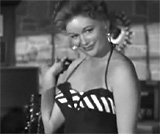
|
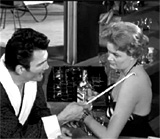
|
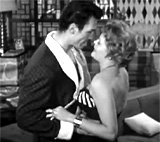
|
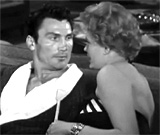
|
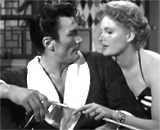
|
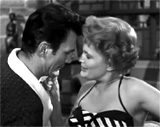
|
|
Buddy's Promiscuous Alcoholic
Wife Connie Bliss (Jean Hagen)
|
- Charlie became annoyed with Connie when interrupted
by a phone call from Buddy asking if Connie was with him;
before he hung up, she kept poking him with the back-scratcher
and he forcefully pushed her away; she happily claimed that he
had hurt her a second time: ("You like that, don't you?"), and
told him what she believed in - hinting at sex: "Fun, Charlie,
not gloomy thoughts. Perfume and staying young, and goodies of
every sort and description. Secrets and locked doors, and doing
the wildest things that come into my mind"; he asked her to go
home to avoid causing any more "trouble" for himself; instead of
leaving, she slowly grabbed the alcohol bottle to follow him up
the spiral staircase to his bedroom, as the volume of the jazzy
soundtrack became deafening
- in the next sequence, after many attempts at phoning
Marion, Charlie met with her at the beach house; he invited her
to attend dinner at the Bel-Air house with the Bliss couple; she
agreed to attend - with Hank; after dinner, the group watched one
of Charlie's movies made 8-9 years earlier, starring him as a
young boxer; after the Bliss' departed, Charlie learned that Hank
would be leaving for NYC in just a few days; Charlie angrily complained
that Hank had proposed to Marion, believing that Marion would never
leave him; however, she informed Charlie: "I
make my own decisions..."
- privately as they talked together,
Charlie was clearly upset and facing inner turmoil, fearing that
Marion was about to leave him: "This is all a bleak and bitter
dream, a real dish of doves. You come in here and throw this mess
of naked pigeons in my face. What can I do, what can I say?";
he claimed there were only two ways to forget everything - get
drunk, or stick a pencil in one's eye; she told
him that she was seeing a divorce lawyer the next morning; he begged
her not to leave him: ("While I'm charming the world with my light
fantastic, I'm bleeding to death under my shirt")
- as he drove her back to her beach house, Hank demanded that Marion
make a choice between them: ("Either you still love him and you want
to live with him, or you don't love him and you don't want to live with him")
- the same evening, Smiley invited himself into Charlie's
place for a drink after attending a loud "bash" at Monte
Ritz' nearby place; he expressed worries about the studio's "tramp"
Dixie Evans (Shelley Winters): "Her mouth's too big"; Charlie knew
she could also be problematic for Marion, since Dixie, another
of his own floozies, was a passenger in Charlie's car on the night
of his accident; Charlie called her at the party and invited her
over to swim in his pool just before Smiley slipped out
- Dixie was a typical struggling, contracted, and
disrespected starlet - an overtalkative individual who had been
"bought" off with a studio contract to keep her quiet, and now
for two months, the studio had been trying to buy out her contract;
Smiley implied that if the outspoken, "blabbing" Dixie threatened
to continue speaking out, there was talk of removing
her permanently: ("We have to get rid of her...she's gotta get
fixed so she never opens her mouth again...she'll have to be removed");
before leaving, Smiley demonstrated how he could tell Charlie's
personality-type - "The warrior minstrel with the forlorn hope"
- once the shapely Dixie arrived, she told him that
she liked him because he was kind to her; she claimed she was waiting
for "Mr. Right" to come along, although her "name was mud in Hollywood";
Charlie warned her about "needling"
the studio about her knowledge of his accident because it made
them nervous: ("Hoff's a man with a crocodile temper"), but she
assuredly told him not to worry or be afraid of her; however, she
claimed that she had been mistreated within the hateful system: ("They hired me for my figure, not
to act"); she resented how the studio had promised her roles, but had in fact sordidly used
her as a personal plaything for visiting exhibitors; she told how
they regarded her as a "deductible item" and
how she hated the studio: "They louse you up and then they call you a louse"
- the two were surprised by Marion's unexpected late-night
entry; Dixie was introduced and then she quickly departed, as they
both vowed that their conversation was quite innocent; Marion noted:
"It's lucky I didn't find Adam and Eve in the swimming pool";
she felt foolish for thinking that he needed her: ("I'm all
kinds of a fool for giving you a second thought, aren't I?")
and insisted on calling for a taxi, but he vehemently insisted
she stay so that for once, they could talk; he felt she was about
to destroy the two of them: ("And tonight, you're about to
possibly destroy your life and certainly mine... Where is the rich,
full-hearted woman I know you to be?"); she was exasperated
by him and began beating on his chest: ("I'd like to beat
you"),
but he vowed that he needed her love and would be devoted to her:
("I promise you, understanding,
devotion, anything I can give you...If you stay, it's gotta be
real"); she walked away from him toward the spiral staircase
and told Charlie: "Do me a favor, will you? Grow up before
it's too late"
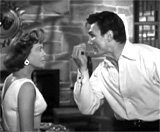
|
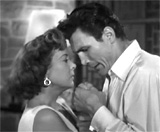
|
|
Charlie and Marion's
Last Real Talk About Their Relationship
|
- the next day at the studio, novelist-writer Hank
said goodbye to Charlie before leaving for NYC, to write his book:
("A fable about moral values, success, happiness"); Hank believed
that Marion would ultimately not be happy remaining in Hollywood
with him, because Charlie was an "idealist" who had "sold out":
("You joined the Hoff-Coy and Co. and that left you half an idealist.
There's nothing more tortured on the face of this earth, neither
fish nor fowl. A man who sold out his dreams, but he can't forget");
as they parted, Hank described how there were three kinds of men:
Realists (like Coy), Philistines (like Hoff), and Idealists (like
Charlie's past self); he cautioned: "Half-idealism, Charlie, is
the peritonitis of the soul"
- Smiley stopped by to report to Charlie that the
annoying and drunken Dixie had been assaulted and beaten up by
Hoff (she had a broken rib); she was threatening to retaliate ("to
spill your story to the press") - by revealing
to columnist Patty Benedict Charlie's studio-covered-up drunken
hit-and-run car-crash accident that killed a child; there were
suggestions that Charlie help do away with "trollop" Dixie
by meeting her at a bar and taking her back to her apartment to
poison her martinis with doctored gin, to keep her quiet; Smiley
implied that Charlie was indebted and married to his duplicitous "scheme"
when the studio bailed him out, and he was obligated to act; when
Marion entered the room, Charles was ready to accuse Smiley of
plotting to murder the passenger (a "studio bit-player")
who was in his car the night of the accident, although Smiley downplayed
the "fanciful" accusation by noting that Charlie was
drunk
- in the next scene, Nat and Stanley Hoff (with Smiley)
were summoned to the star actor's Bel-Air mansion; during their
second confrontation, the blowhard and despotic
Hoff denied the accusations that he (through Smiley) had plotted murder
- the defiant Charlie expressed how he was tired of
being pressured by Hoff; the egotistical studio chief countered
with a screaming tirade that he would reveal the truth about Charlie's
accident and ruin his career: "We know who the expert is when
it comes to murder....A boy like you. Who are you? Who are you? Are
you some kind of special aristocracy because the, the female public
wants to make love with you? Who are you with your dirty, unmanicured
fingernails. And what, what are you without Hoff Federated behind
you? I built the studio! I, I with my brain and my hands! I ripped
it out of the world, with my brains and my hands. And who are
you?"; Charlie vowed to never directly speak to Hoff again
- during the conversation, Smiley also suggested another
"solution" - (Charlie called it the "old switcheroo") - that
Charlie divorce his wife and marry Dixie to keep her quiet; Hoff's
studio even stooped lower with threats to extort Marion by exposing
secretly-recorded 'taped' conversations (on long-playing vinyl records
and audio recordings) of her affair with her close friend 'Hank'
Teagle in his studio office and "on his couch"; while the recordings
were being retrieved from the car, Nat ended his career by denouncing
Hoff: "You're the meanest, dirtiest skunk that God ever put breath into!"
- enraged by the thought of the recordings,
Charlie broke one of the two records in half in front of Marion,
and moved forward to strike Hoff, who defensively put his arms
into an X posture in front of his face, as Charlie told him: "Ah,
you're so lucky, yet if this were a movie, you'd have been on the
floor ten times. (He lightly slapped Hoff across the forehead)
It's just a small token"
- there would be fateful consequences due to Charlie's
resistance to the studio, and his refusal to do the studio's bidding;
Hoff vowed he would reveal Charlie's crime: "I'll break you!...Nah,
nah. I'll let the law do it for me. l'll let the law do it for me
this time, and you lose everything. You lose everything. This is
the scandal and a disaster and a ruin. And that dead child's family
and the insurance company will take everything off your back in any
court in the land. The clothes off your back, off your child, and
off that woman. Everything goes, Charlie. Everything goes, the house
goes, the paintings go, and you! Aw, you go! Oh no, Charlie. Oh no.
You threw away a kingdom today"
- [Note: The crash incident recalled Clark Gable's
similar dilemma, although Snopes.com ruled it as false,
when Gable in 1945 - while driving drunk - allegedly killed a pedestrian
on Sunset Blvd. in residential Brentwood (LA), and the crime was
covered up by studio publicist at MGM who conspired with the DA
to blame it on an uninvolved lower-level executive. In reality,
the drunk Gable only hit a tree, caused some injury to himself,
but no one else was hurt.]
- after Hoff and Smiley left, Nat offered to give
Dixie $10,000 before he also departed; in the quiet of their home,
Charlie and Marion sat on the sofa and embraced; Charlie - with
Marion, decided to call Hank (who was leaving town the next morning)
and ask him over for advice; the two listened to the second record
on the phonograph that proved Marion's love for Charlie ("I'll
never leave him, Hank...He's part of me"); they tearfully embraced
- suddenly, a frazzled Buddy (Charlie's studio publicist)
entered and chastized his friend Charlie for betraying him (after
taking the rap for him), by sleeping with his mocking wife Cass:
("She laughed in my face"); he spit onto Charlie's face and declared:
"That's how I resigned" before leaving; Charlie
pledged a "better future" to
Marion; he also asked: "Have I told you today how much I love you?";
she responded in kind: "I love you and I'm committed to you. We
won't talk about the past"; Charlie exited up the spiral staircase
to his bath
- after Smiley returned to the house, he phoned
Hoff with news that Dixie had been conveniently silenced ("killed
instantly") when she drunkenly emerged from a bar (where she had
been drinking with Monte Ritz) and a city bus ran over her on Sunset
Blvd. (she had earlier revealed that she couldn't see without glasses)
- Charlie, who was upset by Dixie's predicament (did
he overhear Smiley's phone call?), committed suicide in a hot bath
prepared for him by Nick in his upstairs bathroom by slashing his
wrists (off-screen) - his death behind the locked bathroom door
was signaled by water leaking through the downstairs ceiling; Smiley
and Marion went upstairs to investigate, and moments later, Hank
arrived

The Leak Through The Downstairs Ceiling
|
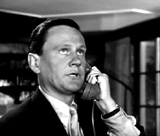
Smiley Coy's False Reporting of Charlie's 'Heart
Attack'
|
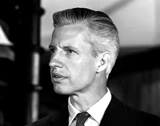
Hank's Truthful Put-Down of Smiley
|
- when the opportunistic Smiley returned downstairs,
he called in a falsified news release for the press from Charlie's
home phone: "Charlie Castle, reknowned star of 30 Hoff Federated Pictures, (Marion screamed)
died today of a heart attack in his Bel Air home, at 7:55 Pacific
Daylight Time. At his bedside was his physician Dr. Curley, his wife
Marion, his 7 year-old son Billy, and his close friend and associate
Stanley Shriner Hoff. Now get that out to the AP, UP, and the rest
of the wire services. Don't ask questions! Bring a dozen studio cops
when you come. This place is gonna be a madhouse in a minute. What?
Tell Stanley he slashed himself in three places"
- in the conclusion, Hank dismissed Smiley so he could handle the situation
himself without another cover-up - and so he could tell the real
truth without it being spoiled by the studio: "I'll
talk to the reporters...Your work is finished here. There will be
no photographers, no more lies, no display. I'll tell the story.
He killed himself out of the pain and anguished love he had for others,
he gave up his salvation. But no man had a greater reverence for
life, a greater zest for living. Yes, he was wrong. But he just couldn't
go on hurting those he loved"
- as the film concluded, the bewildered Marion repeatedly called out as she hugged
Charlie's coat and the camera pulled back sharply and shrank her
in size before a cut to blackness: "Charlie!
Charlie! Help! Help! Help! Help! Help! Help! Help! Help! Help! Help!
Help!"
|
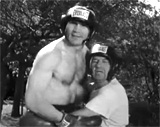
Charles Castle (Jack Palance) Boxing-Sparring With Nick
(Nick Cravat)
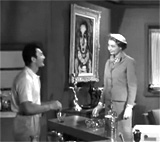
Charlie's Living Room Painting In Background - Speaking to Tabloid Columnist
Patty Benedict (Ilka Chase)
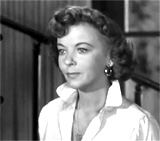
Charlie Castle's Estranged Wife Marion
(Ida Lupino)

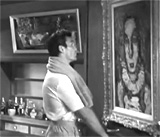
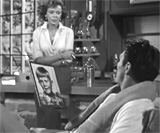

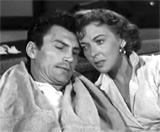
Tensions Between Marion and Charlie As They Tried to Reconcile
Their Marriage


Charlie's Kindly and Spineless Agent Nat Danziger (Everett Sloane)
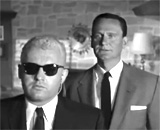
(l to r): Charlie's Harsh Studio Boss Stanley Hoff (Rod
Steiger) and Slimy Assistant Smiley Coy (Wendell Corey)
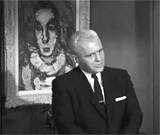
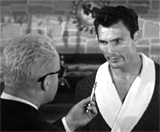
Hoff's Emotional Pressure Tactics to Get Charlie
to Sign His 7-Year Renewal Contract
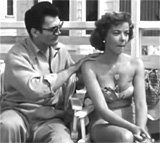
Charlie With Marion At the Beach House
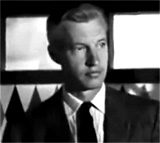
At Charlie's Dinner Party - Novelist-Writer Horatio 'Hank'
Teagle (Wesley Addy)
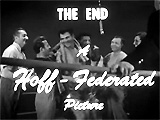
One of Charlie's B-Movies (as a Boxer)
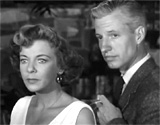
Charlie Was Disturbed That Hank Had Asked His Estranged Wife Marion to
Marry Him
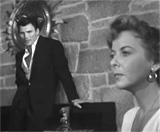
Charlie Learning That Marion Was Planning to See a Divorce
Lawyer
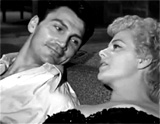
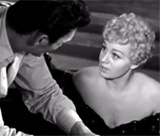
Charlie With Overtalkative Studio Starlet Dixie Evans
(Shelley Winters)
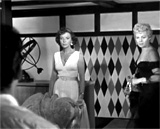
Marion's Late-Night Entry - Interrupting Charlie with Dixie
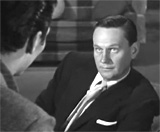
Smiley's Dastardly Suggestion (by Hoff) That Charlie Poison Dixie with
Doctored Gin to Silence Her
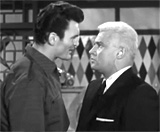
Hoff Denied the Accusations That He Had Beaten Up Dixie and Threatened
to Lethally Poison Her
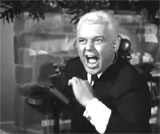
During a Tirade, Hoff Boasted of His Accomplishments
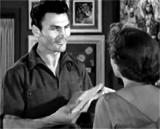
Charlie Breaking One of the Secret Recordings
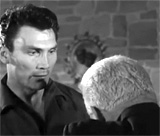

Hoff Attempting to Defend Himself From Charlie's Rage
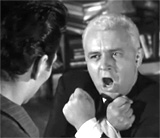
Hoff's Threat: "I'll break you"
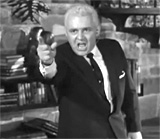
Hoff: "You lose everything!"
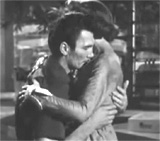
Charlie's and Marion's Tearful Embrace
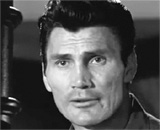
Last View of Charlie

Marion's Final Words of Grief After Charlie's
Suicide
|

































